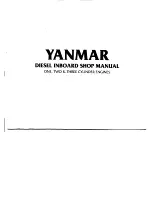
PERIODIC MAINTENANCE
83
Perform the following maintenance every 1000
hours of operation.
• Change coolant
• Check and adjust intake/exhaust valve
clearance
DANGER
Scald Hazard!
• Never remove the radiator cap if
the engine is hot. Steam and
hot engine coolant will spurt
out and seriously burn you.
Allow the engine to cool down
before you attempt to remove
the radiator cap.
• Tighten the radiator cap securely after you
check the radiator. Steam can spurt out during
engine operation if the cap is loose.
• Always check the level of the engine coolant
by observing the reserve tank.
• Failure to comply will result in death or
serious injury.
WARNING
Burn Hazard!
• Wait until the engine cools
before you drain the engine
coolant. Hot engine coolant
may splash and burn you.
• Failure to comply could result in death or
serious injury.
CAUTION
Coolant Hazard!
• Wear eye protection
and rubber gloves
when you handle
long life or extended
life engine coolant. If
contact with the eyes
or skin should occur,
flush eyes and wash
immediately with
clean water.
• Failure to comply may result in minor or
moderate injury.
NOTICE
• Always be environmentally
responsible.
• Follow the guidelines of the EPA or other
governmental agencies for the proper disposal of
hazardous materials such as engine oil, diesel
fuel and engine coolant. Consult the local
authorities or reclamation facility.
• Never dispose of hazardous materials
irresponsibly by dumping them into a sewer, on
the ground, or into ground water or waterways.
• Failure to follow these procedures may seriously
harm the environment.
■
Change coolant
Engine coolant contaminated with rust or water
scale reduces the cooling effect. Even when
extended life engine coolant is properly mixed, the
engine coolant gets contaminated as its ingredients
deteriorate. Drain, flush and refill the cooling
system with new coolant every 1000 hours or once
a year, whichever comes first.
Every 1000 Hours of Operation
TNV_OperationManual_T4(under 19kW).book Page 83 Wednesday, June 17, 2015 11:23 AM
















































